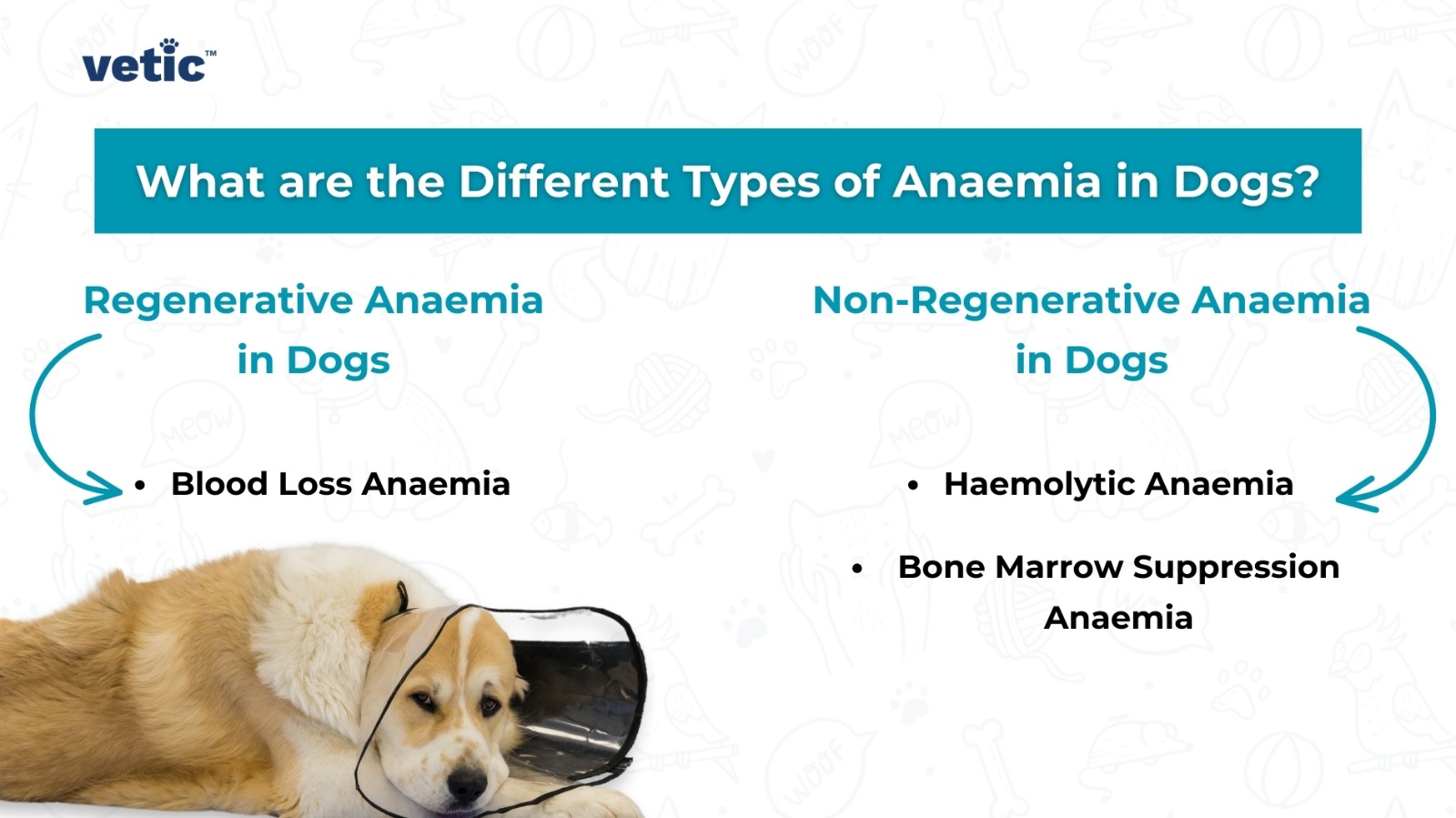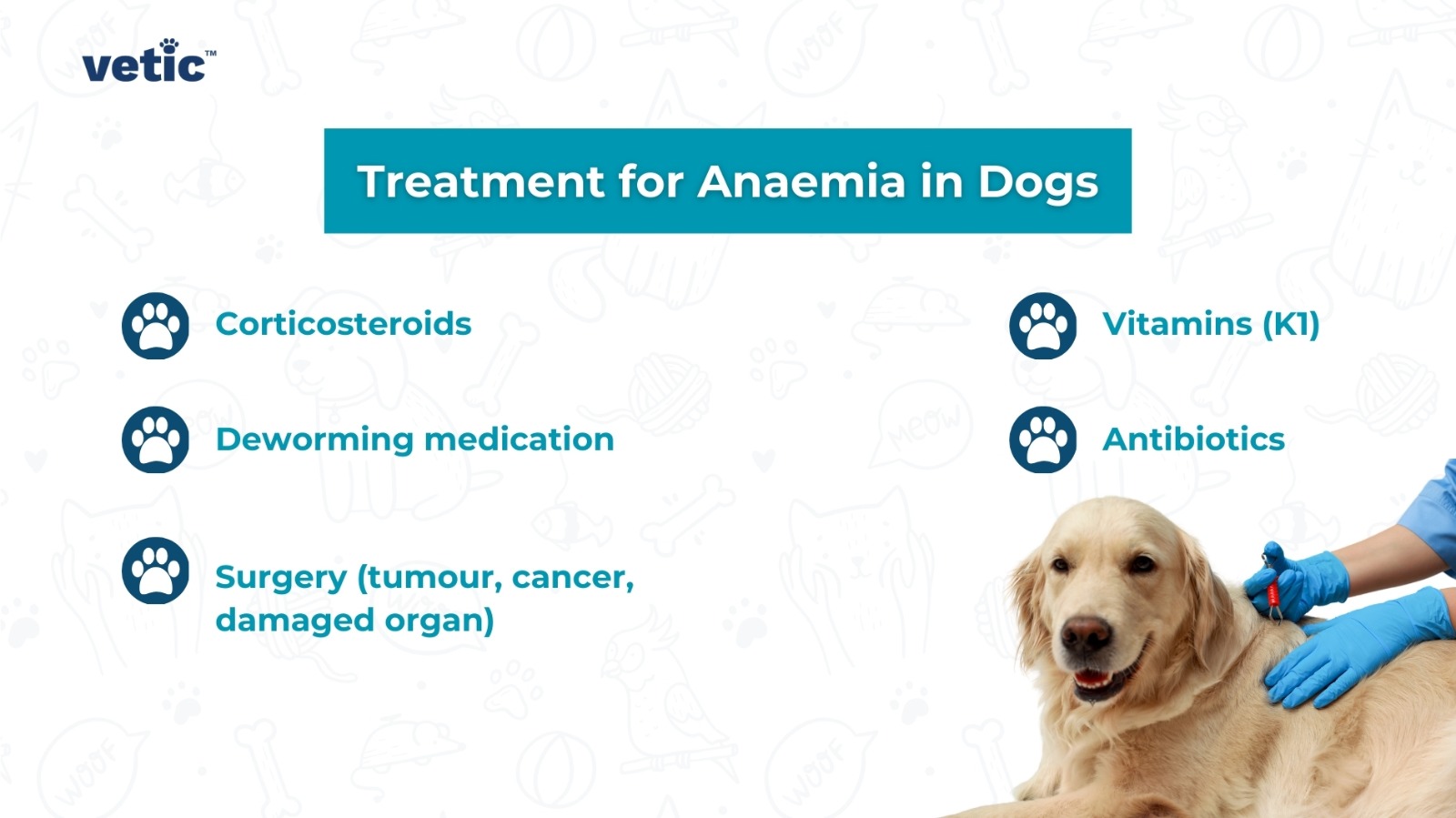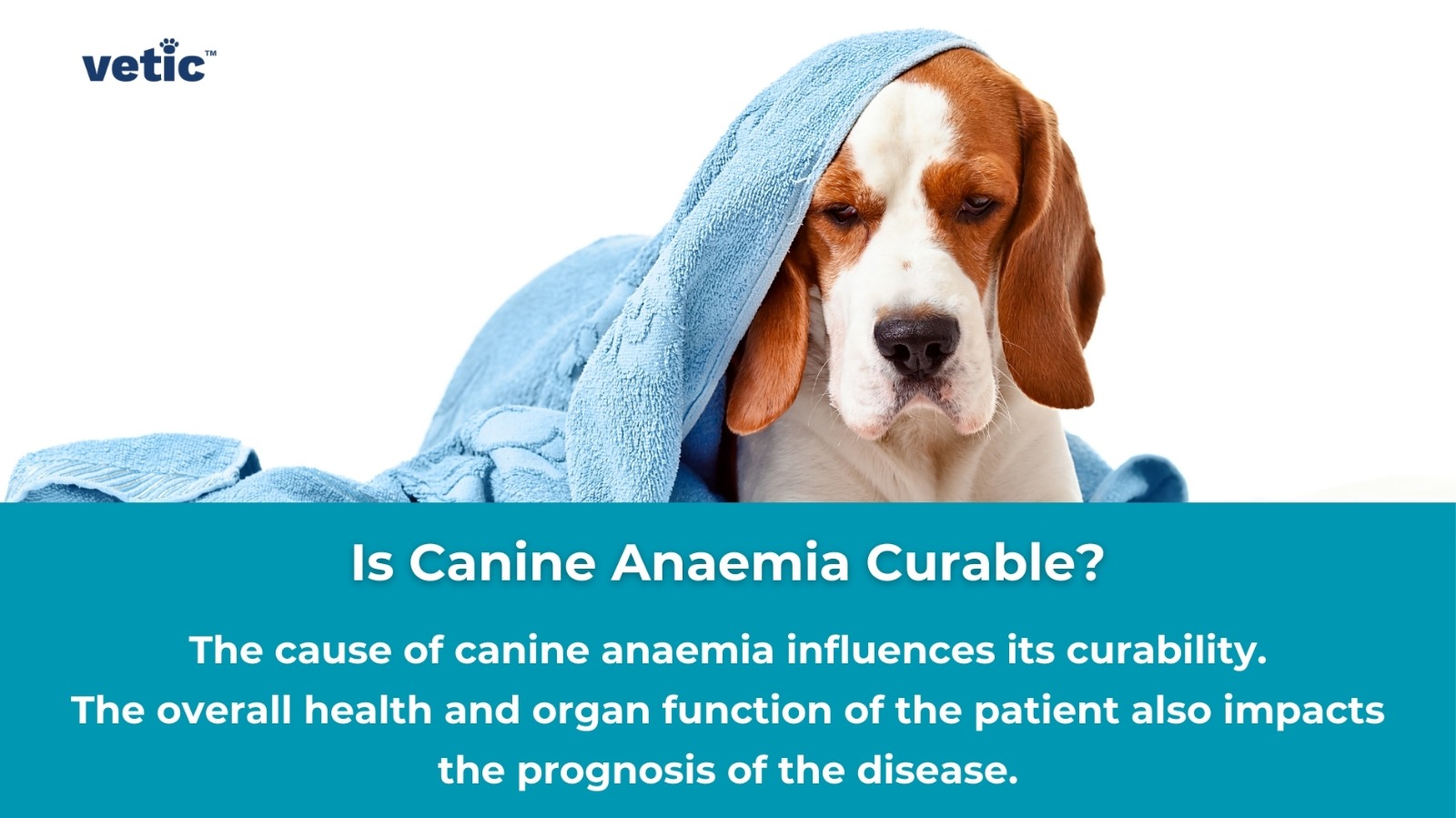Anaemia in dogs refers to the reduced number of RBCs, haemoglobin (Hb) or both in the circulatory system. Anaemia is not a disease but the result of some other disease or condition.
The role of haemoglobin is to carry oxygen to different parts of the body. A dog who is anaemic will show symptoms that are similar to that of hypoxia (lack of oxygen).
The average lifespan of a RBC is around 3 months. When they become old/damaged they are removed from the circulatory system and new RBCs take their place.
So, a reduced number of RBCs is only possible if the rate of destruction is higher than the rate of production of the RBCs.
What are the Different Types of Anaemia in Dogs?

The two basic types of anaemia in dogs are regenerative anaemia and non-regenerative anaemia.
Regenerative Anaemia in Dogs
Regenerative anaemia refers to the condition where the bone marrow responds to the low count of RBCs and/or haemoglobin in circulation. The bone marrow can generate more RBCs in response to low RBCs, but for some reason cannot meet the optimal requirement of RBCs.
Non-Regenerative Anaemia in Dogs
Non-regenerative anaemia is when the dog’s bone marrow doesn’t produce enough precursor RBC cells in response to low RBCs circulating in the system. It can be caused by bone marrow suppression, chronic diseases (renal, cancer), chronic deficiencies and/or inflammatory diseases.
What is the Difference Between Blood Loss Anaemia, Haemolytic Anaemia and Bone Marrow Suppression Anaemia?

Blood loss anaemia is as straightforward as it sounds. It is the lack of enough RBCs and/or haemoglobin in the system due to the massive loss of blood from an open wound. The bleeding can be external or internal.
Hemolytic anaemia is when the RBCs and/or haemoglobin in circulation are broken down faster than they are made.
Bone marrow suppression anaemia happens when the cells inside the bone marrow do not produce enough RBC, WBC and platelets.
What Can Cause Blood Loss Anaemia in Dogs?
The main cause of blood loss anaemia in dogs include –
- Open wounds
- External injury
- Internal injury
- Heavy hookworm infestation
- Huge number of ticks and fleas
- Tumours of the GI tract, kidneys, speel or urinary bladder that begin bleeding
- Clotting disorders
Any disease, disorder or condition that can cause a dog to lose high volumes of blood can cause blood loss anaemia.
What Can Cause Haemolytic Anaemia?
Haemolysis or the rapid destruction of RBCs and/or haemoglobin can be due to several factors. Some of the causes of haemolytic anaemia include –
- Auto-immune disorders, such as immune-mediated haemolytic anaemia (IMHA)
- Tick fever (Babesia)
- Cancer
- Chemicals and toxins (rat poison, garlic, onion)
- Fragmentation of the RBCs (heartworm disease, heart disease, splenic torsion)
What Causes Bone Marrow Suppression Anaemia in Dogs?
Several chronic diseases and side effects of medication can cause bone marrow suppression and subsequent anaemia in dogs. These conditions include –
- Chronic diseases (CKD, Ehrlichia, chronic liver disease)
- Autoimmune disorder(s)
- Chronic nutritional deficiencies
- Hypothyroidism
- Chemotherapy
- Hormone-replacement drugs (oestrogen-based drugs)
- Cancer
Is Iron Deficiency Anaemia Common in Dogs?
While anaemia due to iron deficiency is common among humans, especially in third-world countries, it is an uncommon cause of anaemia in dogs.
Iron deficiency does affect dogs, but it is typically a result of chronic blood loss, hookworm infestations or poor nutrition.
What are the Signs of Anaemia in Dogs?
The most commonly observed signs of anaemia of dogs include –
- Pale gums
- Lethargy
- Fast heart rate
- Loss of appetite
- Laboured/rapid breathing
- Weight loss
Some dogs may also show signs of blood loss such as blood in stool, blood from the nose, blood in urine or vomit. These are all serious signs that can indicate either infection or chronic systemic diseases.
If you notice blood in your dog’s stool, urine, or vomit, or blood from your dog’s nose, you should take your dog to the veterinarian immediately!
How is Anaemia Diagnosed in Dogs?
Apart from the obvious physical signs, veterinarians recommend complete blood count (CBC) and packed cell volume (PCV) aka hematocrit (HCT) to check the extent of RBC/haemoglobin deficiency.
In a healthy dog, the PCV should be 35% to 55%. A PCV value of 35% and below, the dog is considered anaemic.
RBC count and haemoglobin count are other tests that are necessary to diagnose anaemia in dogs.
My Dog Has Anaemia. Does He/She Need Additional Tests?
If your dog has low PCV, RBC and haemoglobin, your veterinarian will recommend other tests to determine the root cause of your pup’s anaemia.
Reticulocyte count
The presence of reticulocytes shows that the anaemia is regenerative and responsive. It is a good sign since the body has the capacity to correct the deficiency of RBC or haemoglobin.
Bone marrow biopsy
If your dog’s anaemia is nonregenerative then your veterinarian may decide to complete a bone marrow biopsy or aspirate to check if the bone marrow is healthy enough to produce RBC precursor.
Stool sample test
A stool test is important to determine if there are parasites that might cause blood loss and anaemia in your dog.
What is the Treatment for Anaemia in Dogs?

If your dog has life-threatening anaemia which is causing severe heart and respiratory issues, a blood transfusion may be required. Blood transfusion in dogs is common in cases of Bebesia, Ehrlichia, hemolytic anaemia, severe blood loss and a few cancers.
Transfusion is not a long-term treatment for anaemia in dogs. It simply stabilises the dog for long enough for the actual anaemia treatment to work.
The treatment for anaemia depends on the underlying cause. Treatment for anaemia in dogs may include
- Corticosteroids
- Deworming medication
- Vitamins (K1)
- Antibiotics
- Surgery (tumour, cancer, damaged organ)
A combination of one or more treatments can be needed by a dog depending upon the factors that cause and exacerbate their RBC and haemoglobin deficiency.
Is Canine Anaemia Curable?

The cause of canine anaemia influences its curability. The overall health and organ function of the patient also impacts the prognosis of the disease.
In the cases of early diagnosis of anaemia due to infectious causes or deficiencies, the prognosis is fair to good. Such forms of anaemia can be managed well enough although may not be cured.
However, when the anaemia is severe and organs such as the liver or kidney are involved, the prognosis is less favourable. Severe anaemia due to cancer, autoimmune diseases and toxins have poor prognosis.

